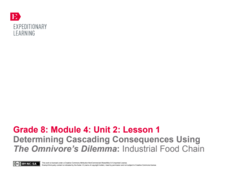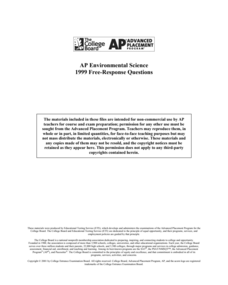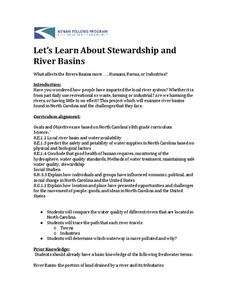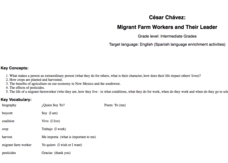Texas Education Agency (TEA)
Working Cooperatively in a Social System
Using an informative resource, scholars view a PowerPoint about working cooperatively in a social system. Pupils then use their newfound knowledge to create a flowchart defining the systems of an organization.
Texas Education Agency (TEA)
Scope of Agriculture on Society
Butcher, trucker, inspector ... so many options, so little time! Scholars pick a career in agriculture and describe it, writing about the education requirements. They also receive direct instruction about the agriculture industry...
Texas Education Agency (TEA)
Demonstrating Identification Techniques for Beef Cattle
Welcome to the ranch. First, pupils learn about the history of cattle branding with an informative PowerPoint and class discussion. Then, individuals develop a unique brand and practice branding their own paper cattle.
Texas Education Agency (TEA)
GIS GPS in Agriculture
Let's navigate! Using the informative resource, pupils perform a WebQuest on the benefits of Geographic Information Systems and Global Positioning Systems. Then, they write a brief summary describing how both systems benefit the...
Texas Education Agency (TEA)
The FFA Creed and Song
Learners memorize the first sentence in each paragraph of the Future Farmers of America (FFA) creed. Once memorized, they complete a worksheet on the FFA creed before reciting the lyrics in rap form.
National Endowment for the Humanities
The Mexican Revolution
The legacies of the Mexican Revolution are visible today—even if some history classes don't cover them. Using primary sources from leaders in Mexico at the time of the popular uprising and other evidence, such as railroad maps, young...
EngageNY
Determining Cascading Consequences Using The Omnivore’s Dilemma: Industrial Food Chain
Which of Michael Pollan's four food chains from his book The Omnivore's Dilemma would best feed everyone in the United States? Using a thought-provoking resource, scholars learn how to create a Cascading Consequences chart to answer the...
Learning Games Lab
Bacteria Sampling
Scholars explore the procedure for bacteria sampling in a virtual lab by first walking through a detailed step-by-step procedure of preparing the samples of raw milk and pasteurized milk, growing the bacteria, and comparing results....
Learning Games Lab
Testing for Corn Mold
Learners complete a virtual lab to test for a corn mold that can lead to dangerous toxins. They walk through a detailed step-by-step procedure then see their findings. Throughout the activity, they learn how to use lab tools and practice...
College Board
1999 AP® Environmental Science Free-Response Questions
Pollution is a real concern in most areas of Earth. A four-question AP® assessment has learners analyze data related to water pollution and air pollution as well as consider the pros and cons of recycling. Each question has several...
College Board
2004 AP® Environmental Science Free-Response Questions
Radioactive isotopes have a wealth of uses, but their waste may cause some concern. One of four free-response questions challenges learners to devise a waste removal strategy for medical radioactive substances. Other questions address...
College Board
2012 AP® Human Geography Free-Response Questions
Why do countries create boundaries? Scholars explore similar ideas using prompts from the 2012 AP Human Geography test. Pupils also test their acumen with questions on agriculture and the growth of Islam.
College Board
2016 AP® Human Geography Free-Response Questions
Do your learners have the test-day jitters? Questions from the 2016 administration of the AP Human Geography exam allow for extra practice on topics such as economic activity, national identity and language, and agricultural practices....
College Board
2018 AP® Human Geography Free-Response Questions
What role do women play in agrarian economies? How has gentrification affected neighborhoods in positive and negative ways? To what extent has language evolved over time? Learners consider these questions using authentic test questions...
College Board
2007 AP® Human Geography Free-Response Questions
Indigenous languages are making a comeback in some parts of the world. People now see land use patterns in our cities' marketplaces. Why do these things happen? Queries from the 2007 AP exam in Human Geography unpack these complicated...
Population Connection
Meeting Human Needs
How to meet the needs of people around the globe—a question many ask. The fifth in a six-part series about human population and its effects on the globe, the eye-opening activity includes discussion, a homework activity, and an in-class...
Kenan Fellows
Let's Learn About Stewardship and River Basins
What does it mean to be a good steward? Middle school environmentalists learn to care for their state's waterways through research, a guest speaker, and poster activity. Groups must locate and learn more about a river basin and the human...
American Farm Bureau Foundation for Agriculture
Welcome to My American Farm!
Take a step into the virtual farm world and explore the impact farming has on our everyday eating habits. Future farmers discover the meaning of agriculture and the hard work that goes into providing food for us to enjoy. A computer...
American Farm Bureau Foundation for Agriculture
Shapes in Agriculture
It's time to get crafty with shapes! Your future farmers demonstrate their geometric ability by building a farm using triangles, circles, rectangles, and squares. But first, scholars take part in a brainstorm session inspired by their...
San Francisco Public Utilities Commission
Our Water: Many Users - Many Uses
California's water supply is not always stable. Learn about the ways that California weathers a drought with a reading activity about water usage and agriculture. Once kids finish the reading passage, they answer a series of...
University of New Mexico
César Chávez: Migrant Farm Workers and Their Leader
During the first week of instruction, middle schoolers research biographies on Cesar Chavez and make a pictorial collage of his life. For the second and third week, they maintain a seven-day diary of a farmworker and write a poem. For...






















